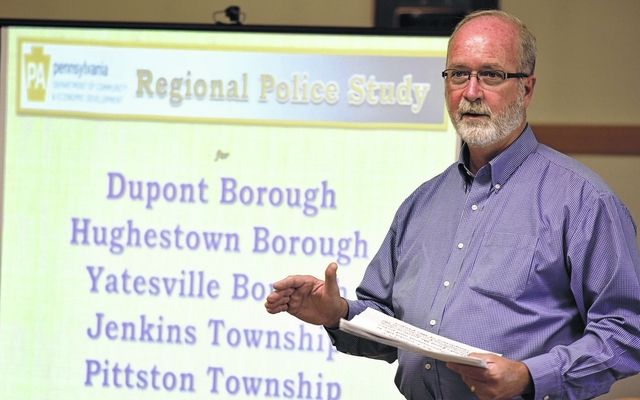Click here to subscribe today or Login.
LAFLIN — Tensions peaked between residents, Laflin council members and Jenkins Township Supervisor Bob Linskey at a special meeting Thursday over the attempted effort to push through a $65,000 annual contract that would allow Jenkins to act as the borough’s police force for 2018.
Linskey, who is also chairman of the Regional Police Study group, discussed the contract and how the two communities have reached this point. However, it was made clear by the majority of Laflin residents that the proposed police deal was both unnecessary and unwanted.
State Police currently provide coverage to the borough.
According to Linskey, Laflin was originally part of the regional police study that was conducted by the state Department of Community and Economic Development. After disbanding their own force in 2014 for budgetary purposes, Laflin pulled out of the study only to re-enter the group in September 2016. While the study is struggling to stay afloat after the departure of Duryea, Jenkins Township is still continuing contracts with local municipalities, such as Yatesville.
Under the contract, Laflin would share two full-time officers for calls and roaming patrols for two out of three shifts with Jenkins Township and Yatesville, plus additional part-time officers. Should Laflin vote to have Jenkins provide police protection, it would come at an annual cost of $65,000 for a three-year contract. If declined and a regionalized force formed, Linskey said the cost would then rise to $107,217 annually.
“I think it’s just so important to have a local police force driving up and down the roads to help deter crime,” he said after the meeting. “I wouldn’t want (my daughter) to live in a town that didn’t have police coverage.”
Laflin council president Glenn Gubitose was not present for the meeting.
‘Waste of time’
Many residents spoke out against the proposal, reciting many of the same questions over and over that were being left unanswered and causing the equivalent of a shouting match at times. Two main concerns voiced during the meeting was how would the borough pay for three years of coverage and why was council trying to push through the contract just weeks before new members take their seats.
Local attorney and former Laflin solicitor Bruce Phillips said he was there on behalf of some of his clients. Phillips explained the budget could be amended until Feb. 15th, and that even talking about the subject was “a waste of time.”
“If you enter into an agreement, it’s not going to be worth the paper it’s written on,” he said. “The new council has until February 15th to eliminate all funding for that, so I don’t even know why you’re having this meeting.”
As for the budgetary concerns, several residents said the borough simply does not have the funds to pay $65,000 a year for police. Incoming councilman Paul Benderavich said while the borough has a current surplus, the money won’t last should the police deal be approved.
A former councilman from 2008 to 2013, Benderavich was once again elected to serve. Other newly elected council members also voiced their displeasure.
“With this proposed contract, (council) is using carry-forward money that we left them two years ago,” Benderavich said. “So technically, they’re running a deficit. Year two and three, taxes would have to go up again.”
Throughout the meeting, residents griped about how Laflin already carries one of the highest tax rates in the county, yet is home to one of the lowest crime rates.
On the other side, some residents and council members said a more locally based force is needed to keep the borough safe and speed up response times.
Laflin resident Jarrett Ferentino believes a local force is necessary in small communities, citing his concerns for the safety of his family and two children.
“What we have here is an extremely residential, suburban community that would benefit greatly by having a local department that will allow those members to build relationships with our neighborhoods, cultivate networks of information,” he said. “We don’t have that with the spread-shot effort of coverage that you get with the State Police servicing the entire region.”
Frustrated with the mostly negative response, Linskey asked the over 50 attendees in a show of hands who supported the contract. Only about 10 raised their hands.
Resident Marla Ogof asked the same question she was trying to have answered since the beginning of the meeting:
Why is an outgoing council trying to push through the contract now rather than wait for the newly elected council to decide?
“Because it’ll never pass (with the new council),” Linskey said.





